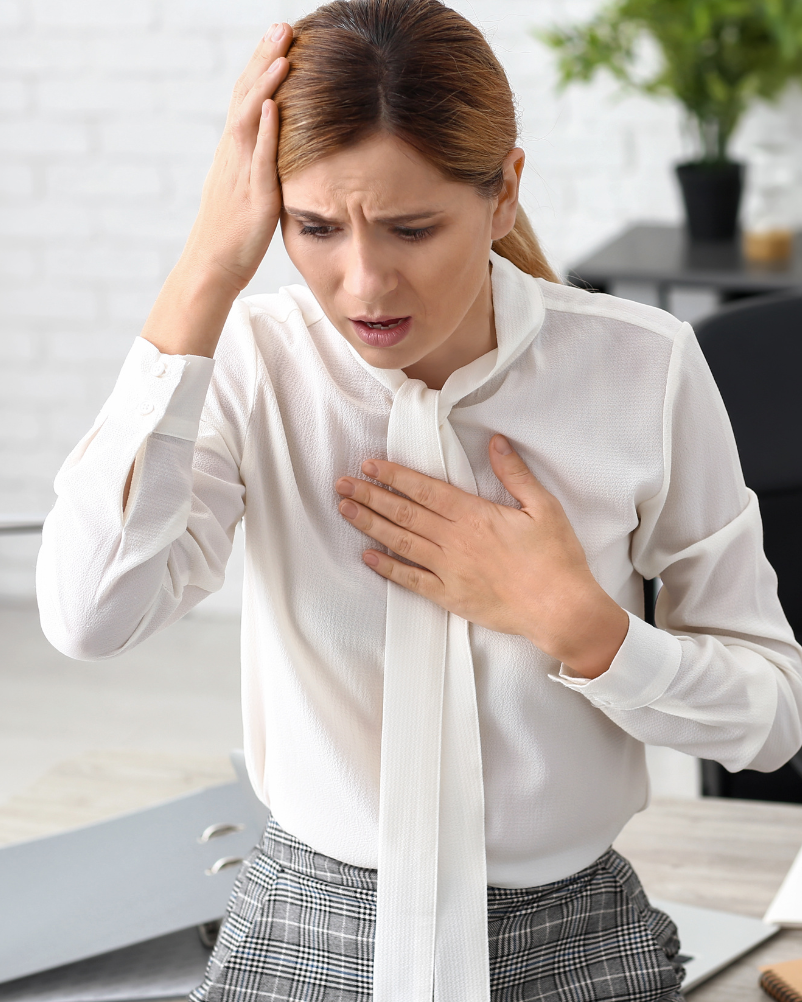
Are you over 40 years old? Does the word menopause scare you? I know it did for me. I started menopause in 2019 right before the pandemic, and it hit me hard. Weight gain, trouble sleeping, brain fog, you name it, I got it (except for night sweats, I am always cold). In this article, I’m going to discuss facts about the symptoms, treatments, and coping
with the menopause stage of life. (will it ever end?)
Menopause is the time in a woman’s life when her periods stop, and she can no longer become pregnant. It happens yearly for about two-thirds of women, but it can start as early as 40 or 50 years old. The average age for menopause to happen is 51 years old, but some women may go through it sooner or later than this.
Symptoms of menopause
Menopause is a natural process and a time of change. However, you may experience some of the following symptoms:
- A disruption in your usual ovulation cycle (your hormones no longer release eggs).
- A change in the level of fertility or the length of your menstrual cycle (this can vary from woman to woman).
- Changes in sexual desire, interest, or performance. Some women experience increased sexual attraction, while others may notice a decrease. This may also be accompanied by vaginal dryness and/or irritation that can make sex uncomfortable for some women. Other common symptoms include hot flushes and night sweats which are not uncommon during this stage of life for many women.
Treatment for menopause
Hormone replacement therapy (HRT) is a treatment that involves taking medication to replace the hormones naturally produced by your body. It’s usually taken as tablets or patches, but gels and creams are sometimes used. HRT can be used to treat symptoms of menopause, for example, hot flushes and night sweats, as well as psychological issues associated with menopause such as depression or anxiety.
There are different types of HRT available:
- Estrogen is a category of sex hormone responsible for the development and regulation of the female reproductive system and secondary sex characteristics -only HRT – this contains only estrogen; it may be prescribed if you have had a hysterectomy or not had your uterus removed during surgery (uterine sparing)
- Combined estrogen and progesterone – this type of HRT is also known as ‘natural’ or ‘bio identical’ hormone replacement therapy (BHRT).
Coping with menopause
Menopause can be difficult, but there are ways to make it easier.
- Stay active and healthy. A healthy diet and staying fit will help you cope with the symptoms of menopause. Eat lots of fruit and vegetables, drink plenty of water, and exercise regularly. If you smoke or drink too much alcohol, it may be worth cutting down or stopping as they can make you feel more anxious or depressed than usual during this time in your life.
- Talk to friends or family if you feel overwhelmed by what is happening to your body and how it affects your life. Try not to bottle up your feelings on this subject, as they might not understand how distressing this time can be for some people – even those who have been through it before!
- Try not to worry about things too much – remember that everyone goes through changes when they reach middle age, so don’t beat yourself up about feeling different from other people around the same age as yourself at this point in time.
Other things that can cause similar symptoms to menopause
You may also experience some or all of these symptoms if you have:
- Stress. When you are stressed, the adrenal glands release higher than normal levels of the stress hormone cortisol. This can contribute to low estrogen levels and hot flashes.
- Illness or infection. Menopause does not cause disease but may worsen existing conditions by lowering your immune system function.
- Depression and anxiety disorders (such as bipolar disorder). Women with depression or anxiety disorders are more likely to have problems during menopause because hormonal changes can worsen these conditions by affecting neurotransmitters in your brain that control moods and emotions (serotonin is one example). If you experience depression during perimenopause—the years leading up to menopause—you may find it harder for your symptoms to go away following menopause instead of relying only on estrogen loss alone!
When to see your General Practitioner about your symptoms
If you have severe symptoms, such as:
- Hot flushes or night sweats that are affecting your sleep and causing you to feel unwell during the day;
- loss of concentration or memory;
- a change in mood (anxiety, irritability); or
- Tiredness/fatigue that’s not improving with rest/sleep.
If you’re still having problems with menopausal symptoms after 6 months, it may also be worth talking to your GP if any of the following apply:
- You’ve tried different treatments, but they didn’t help (for example, hormones)
- You have other health problems that could worsen because of menopause symptoms (for example, type 2 diabetes).
If any of these symptoms apply to you, I recommend making an appointment with your GP as soon as possible for advice about how best to manage them.
Find out how to treat the symptoms of menopause
- Natural supplements: There are no proven natural remedies for the symptoms of menopause. However, some manufacturers claim that herbs and dietary supplements may help reduce hot flushes, night sweats, and vaginal dryness. But these claims are not backed up by sound evidence from clinical trials.
- Hormone replacement therapy (HRT): HRT is a treatment that replaces the hormones your ovaries make when you are younger with similar ones made in a laboratory. It can relieve many symptoms associated with menopause, such as hot flushes and night sweats. The other primary type of HRT is an estrogen-only method (OEM).
- Other medications: Some medications are available to help with hot flushes, night sweats, and depression during this time:
Antidepressants – antidepressants work by changing how certain chemicals work in the brain; they can be helpful for people who have severe depression or anxiety when they’re going through menopause.
Conclusion
Menopause can be difficult for some women, but there are many ways to cope with it and treat the symptoms. If you’re experiencing any of these symptoms, you must see your GP as soon as possible so that they can diagnose whether this is what is causing them. Your doctor will then be able to recommend an appropriate treatment plan for dealing with them, hopefully making things easier in the long run!
Disclaimer: This article was written for educational purposes only. I am just spreading the love by giving my thoughts on menopause based on going through it myself.
Please comment with any questions or experiences you have had. I would love to know. Be sure to join my Facebook Menopause Support Group by clicking here to connect with other women just like you! XOXO Mary



